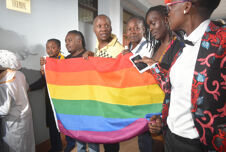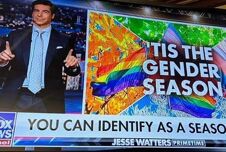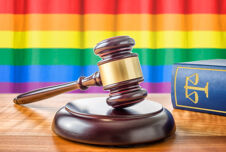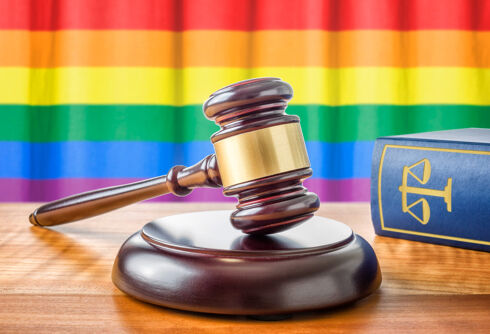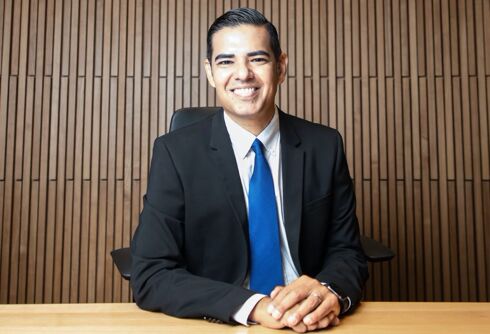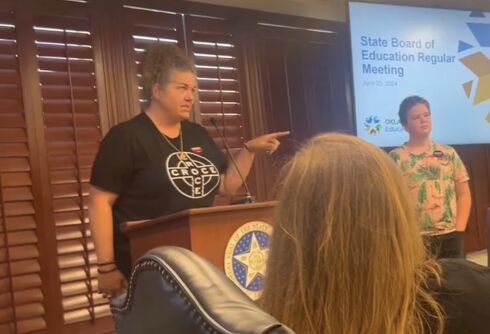SAN FRANCISCO — A panel of federal appellate justices signaled Thursday that they see no reason to overturn a ruling against California’s same-sex marriage ban due to the trial judge not disclosing his long-term relationship with another man.
The three-person panel for the U.S. 9th Circuit Court of Appeals in San Francisco also indicated during a two-hour hearing that they would not release the videotapes of the2010 trial over the ban, known as Proposition 8. The tapes have been under seal since the end of the proceedings.

The appellate court judges first heard arguments in the case last December on whether now-retired U.S. District Court Judge Vaughn Walker was correct in determining that the ban was unconstitutional. But they had delayed their ruling in the matter so that California’s Supreme Court could issue guidance on whether the initiative backers could bring forth their appeal. [The state court recently ruled that they could defend the measure before the federal courts since California’s governor and district attorney have refused to do so.]
Following that hearing last December, Walker acknowledged for the first time that he is in fact gay and has been with his current partner for 10 years. The San Francisco Chronicle had outed Walker prior to his issuing his decision in the case, but Walker did not publicly acknowledge his sexual orientation while he remained on the bench.
Never Miss a Beat
Subscribe to our newsletter to stay ahead of the latest LGBTQ+ political news and insights.
Based on Walker’s disclosure in an interview with a number of reporters, Prop 8’s backers sought to vacate Walker’s judgment on the grounds he should have recused himself from presiding over the Prop 8 case. They contend that he would personally benefit should the courts uphold his ruling because he would then be able to marry his partner.
“The law requires any and all facts known to the judge that are relevant to disqualification must be disclosed,” Charles Cooper, an attorney for Prop 8’s backers, told the appellate justices during the December 8 hearing.
In this instance, Copper said, “if Walker desired to marry his partner, then he stands in the same shoes as the plaintiffs before him.”
In this case the plaintiffs are two same-sex couples who want to marry but cannot due to the passage of Prop 8 by California voters in 2008.
Cooper later said if Walker’s decision is upheld and he does indeed marry his partner, it would be “the single darkest day in American jurisprudence.”
Circuit Judge Stephen Reinhardt of Los Angeles retorted, “Let’s hope however it comes out, it won’t be a dark day.”
Reinhardt and his fellow panelists, Circuit Judge N. Randy Smith of Pocatello, Idaho, and Senior Circuit Judge Michael Daly Hawkins of Phoenix, all expressed doubts about the Prop 8 backer’s arguments for recusal.
Hawkins early on interrupted Cooper to ask, based on his reasoning, if a “married judge could never hear a divorce case?”
Cooper replied that he didn’t “see the difficulty with that.”
And Smith repeatedly questioned Cooper what evidence there is to suggest that Walker wanted to get married.
“Do we have anything in this record to show that is what he desired to do? You all talk about ‘if.’ But I don’t find anything to show he did,” said Smith.
Smith said he was inclined to agree with current District Court Judge James Ware, who reviewed the matter and found no reason why Walker should not have heard the case.
Reinhardt questioned how far a gay judge would need to go in disclosing their interest or disinterest in getting married. He also asked if the standard for recusal would differ if the judge were gay and single.
“A gay or lesbian judge that desires to marry has an obvious interest in the outcome of the case,” said Cooper.
David Boies, an attorney for the plaintiff couples, argued that the only reason Walker would need to recuse himself was if he had a personal relationship to anyone involved in the case. Whether he wanted to marry or not is of no concern, said Boies.
“The mere fact a judge may benefit from a favorable ruling is not sufficient to recuse,” he argued.
Should the court determine that Walker should have not heard the case because he is gay and might marry someday, Boies said that would create a “pernicious effect” and “an intolerable double standard for minority judges.”
The justices have combined the two appeals on the recusal question and the merits of Walker’s decision. They are expected to issue their ruling on both matters sometime in early 2012.
No matter how they decide, the case is expected to be heard by the U.S. Supreme Court, which could occur as soon as next fall.
Tapes likely to remain sealed
They likely will issue their decision on whether to release the trial videotapes at the same time.
A number of media outlets, as well as the lawyers for the plaintiffs, have sought the release of the trial tapes in order for them to be publicly broadcast. They argue that the transcript and taped depositions in the case are already public record and there is no legitimate reason not to keep the videotapes under seal.
Attorney Theodore Olson argued that the videotapes are merely the written transcript “with video and sound.”
Backers of the anti-gay ban have argued that allowing the public to see the taped trial would result in intimidation and harassment of their witnesses. And they also stressed that Walker had said that “the potential for broadcast had been eliminated” when he entered the tapes into the trial record.
Because of the judge’s assertions no one would see the tapes, the lawyers for Prop 8’s backers told the appellate justices they saw no reason not to believe Walker.
“A grave injury will have been done to the federal judiciary process,” said attorney David Thompson, if a judge’s word is not honored.
It was an argument that seemed to strike a chord with the federal judges.
“There is a compelling case that the word of the court is supposed to mean something,” said Reinhardt.
Reprinted by permission.


